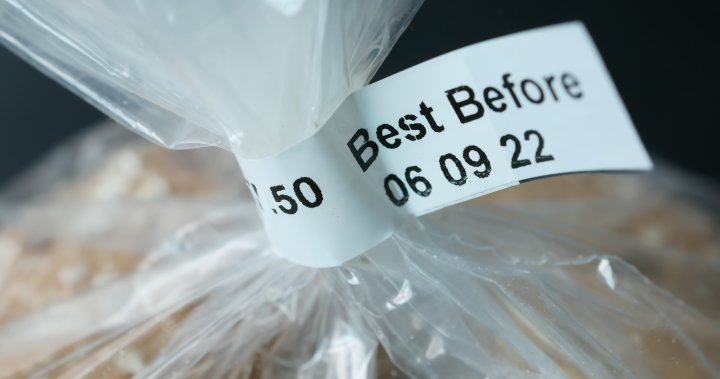Grocery price inflation may finally be slowing across Canada, but as some food costs remain high, a new report has found many are open to consuming “risky foods” despite the potential health risks.
The report, set to be released Thursday by Dalhousie University’s Agri-Food Analytics Lab but provided to Global News in advance, found 58 per cent of respondents said higher prices made them more inclined to eat food close to or past its best-before date. About 37 per cent said their consumption habits haven’t changed.
Among those who said they would potentially eat such foods, 23.1 per cent said they always do so, while 38.6 per cent said they often eat food past its best-before date or are overripe, with a further 30.8 per cent doing the same sometimes. Just 7.5 per cent said they rarely consume food under these conditions.
“So you can tell that food inflation really has push(ed) Canadians to think differently about food,” the lab’s director, Sylvain Charlebois, told Global News. “Not only that, it has pushed Canadians to manage risks, food safety risk at home very differently as well. Food is now an asset and you don’t want to throw it out, if you can utilize it in a way.”
Food scientist Keith Warriner at the University of Guelph said unlike expiration dates, best-before dates are more the company’s “best guess” as to when quality starts to deteriorate.
There are some foods that can be eaten safely even past that date, he says, including dry and canned foods, chips, cured meats and acidic dressings.

Foods like bread, meat, milk and cheese fall more into a category of being able to be eaten but must be done so with caution, Warriner adds. Seafood, deli meats and even leftovers after five days, though, should be avoided, amid concerns of bacteria and other potential dangers that could grow on them over time.
The latest health and medical news
emailed to you every Sunday.
A good way of determining whether foods can be eaten past their date is by using your own senses. If it smells or looks bad it may be best to toss it.
“When we get to the point of it turning to the spoilage, rancid odours, visual, that’s telling you something and it literally isn’t worth taking the risk,” Warriner said.
When asked about whether it’s safe to eat food past the best-before day, the Canadian Food Inspection Agency (CFIA) made a similar distinction.
“There’s a common misconception that food is ‘good’ before and ‘bad’ after its best before date, but these dates are not an indicator of food safety before or after they pass,” a CFIA spokesperson said in an email Wednesday.
“Consumers are encouraged to always use their judgement when deciding if a food can be eaten.”
Nearly half of Canadians surveyed — about 47 per cent — have also turned to using different food storage or preparation methods in order to extend the shelf life of their food, such as freezing bread or keeping produce in humidity-controlled drawers.
Charlebois said a lot can be frozen, but people should still be careful.

“You can think it’s a good thing because you’re we’re probably wasting less food,” he said. “But at the same time, you don’t want people to take on too much risk and compromise their health.”
Warriner adds people should still be cautious with frozen food it can still spoil in some cases if left too long.
Though Charlebois notes the survey is based on self-reporting, the study found 20 per cent of Canadians claimed they got sick after consuming food close to or past its best before date.
As Canadians consider ways to save, Warriner notes there is more that can be done aside from just eating food near or after its best before date while also limiting food waste.
“When you go shopping, don’t try to get these spontaneous purchases,” he said. “Buy what you need.”
© 2024 Global News, a division of Corus Entertainment Inc.




